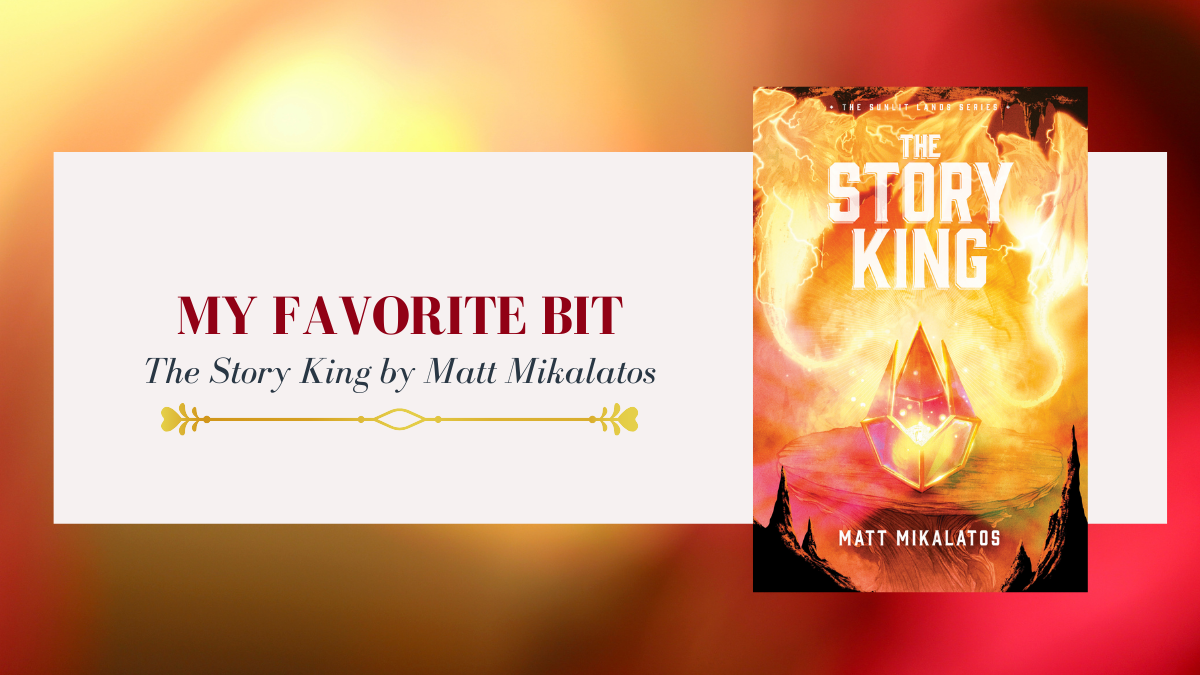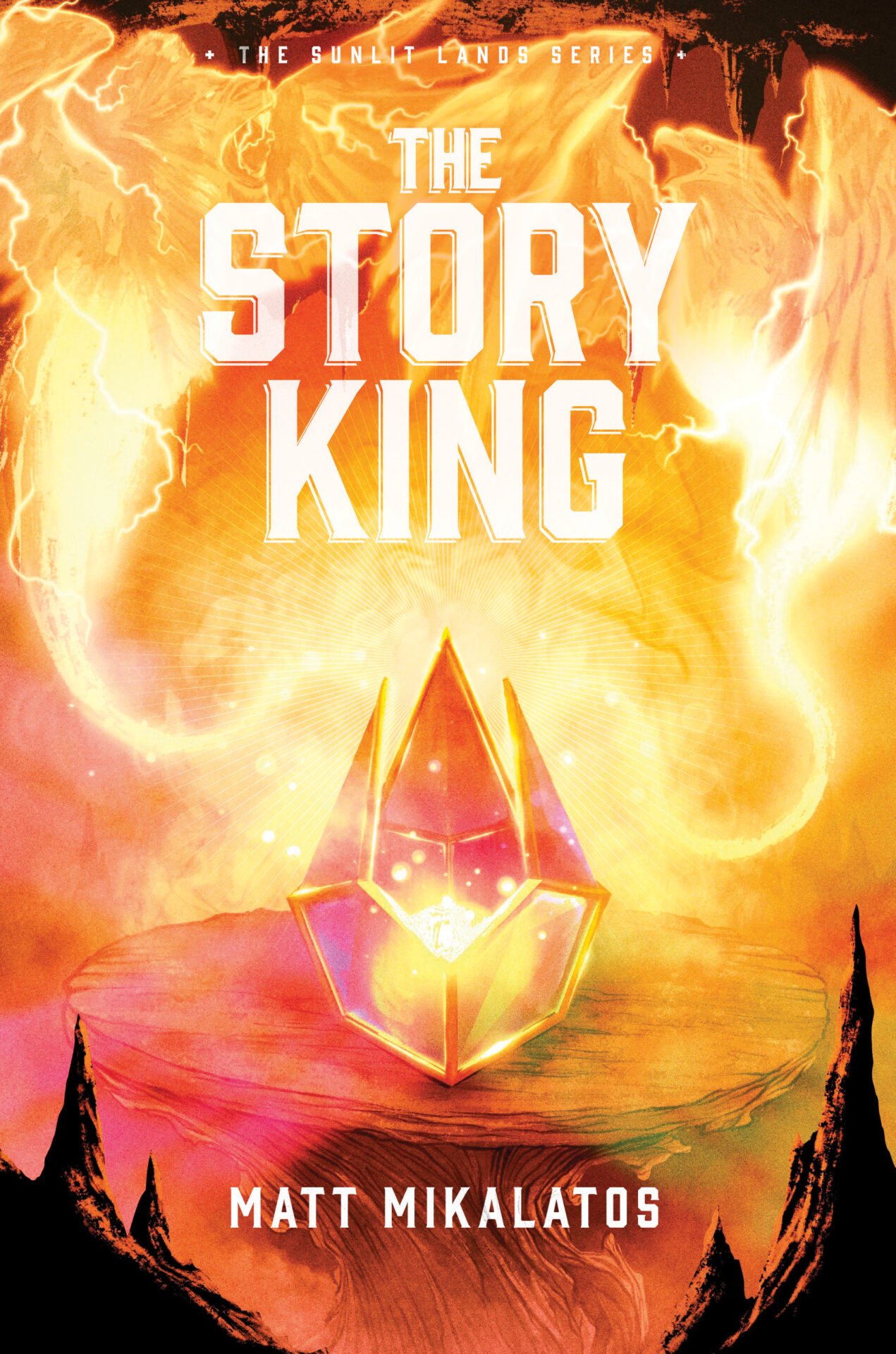
Matt Mikalatos is joining us today to talk about his novel, The Story King. Here’s the publisher’s description:
In the third and final installment in the Sunlit Lands series, the magic of the Sunlit Lands has been reset, but that doesn’t mean all is well. Unrest and discord are growing by the day, and Hanali is positioning himself as ruler of the Sunlit Lands. But, in order for Hanali to seize control, there must be a sacrifice, one that very few are willing to make. Jason, Shula, Baileya, and others must work together to save the lives of those Hanali would sacrifice for his own gain.
What’s Matt’s favorite bit?

MATT MIKALATOS
Once upon a time, Mary Robinette graciously let me share my favorite bit from the first novel in a fantasy trilogy, The Crescent Stone.
And now, this month, the third book in the trilogy, The Story King, has finally hit the shelves!
A lot of this trilogy has to do with power, prejudice, and injustice. In the third book we’re diving deep into questions about memory, about common history, about genocide, and about the stories we tell ourselves to hide truth and the stories that can set us free.
But my favorite bit might just be a speech that one of the main characters, Jason Wu, gives to his assembled people. So much of this book is about learning our own stories, and a “one-word story” that can change the world. Jason is reflecting on his own traditions from back home, on Earth, and he shares this:
“Where I come from, we like to end a story by saying, ‘They all lived happily ever after.’ That’s how we know a story has a happy ending. They all lived happily ever after. I’ve been thinking about that. It’s not ‘I lived happily ever after.’ It’s all of us. You and me. Us. And if one of us has something terrible going on—if there’s one person that the Sunlit Lands is unjust toward—well, how can we all live happily ever after? I guess what I’m saying is, we’re not free unless we’re all free. You and me, together. To say we all lived happily ever after is just to say we have each other’s backs. That when terrible things come, it means we’re going to stand together, and I’m not going to say, ‘No, it’s okay, I’m happy’ if you’re being harmed by someone. That’s what this place could be, if we can figure out how to build it. ‘Happily ever after’ means whatever comes, we’re going to fight for each other.”
I’ve heard “And they all lived happily ever after” my whole life. Usually it just meant that the prince and princess got married. So I really love this idea that Jason shares . . . that living happily ever after is by necessity a community activity, that it doesn’t mean that nothing bad ever happens. It just means that I won’t ignore your pain, and you won’t ignore injustices that happen to me, and together we’ll find a way to move toward healing and doing the right thing.
Throughout the trilogy there have been these little side stories in the appendices: myths from the various peoples of the Sunlit Lands, little bits of songs, proverbs, wise sayings, tall tales. Nearly all of them came after the story, carefully put away in the “optional” pages at the end.
In The Story King we learn that those aren’t extras. These stories that we look at and think are of little or no consequence—a simple phrase like “they all lived happily ever after”—might in fact be the very things that are shaping the world we live in. Interrogating them, taking them apart, reassembling them in new ways, discovering what is true and what should be true in our stories can literally change the world.
So in The Story King there’s no appendix of myths. All those stories are pulled into the text, are told by the characters, are revealed in the context of the world they’re meant to inhabit.
Characters who appeared to be little more than legends in the first two books break into the narrative in The Story King. Creation myths from various cultures within the Sunlit Lands appeared in the previous books, but this time we learn the truth from people who were there.
All of which brings us to this: All around us today, there are many people competing to tell us the story of the world. History and politics and culture and entertainments. Some of those people are telling skewed stories to protect their own power, or to gain it. Some of them are looking to control us. Some of them will tell us, straight out, without blinking, that what we have seen with our own eyes never happened.
But there are others—people like Jason Wu—who are committed to telling stories that are true. Who want us to live lives that move us toward that happy ending, where we don’t have other human beings suffering in one part of the world, or one part of our nation, or in our cities, or in our neighborhoods or in our homes so that someone else can have power or more money or greater influence in the world. There are people who are telling us that we can have a true happily ever after . . . if only we’ll keep our eyes turned toward each other instead of ourselves.
Hearing Jason say those words to the people of the Sunlit Lands . . . that’s my favorite bit!
LINKS:
The Story King Universal Book Link
BIO:
Matt Mikalatos is the author of 7 novels, most recently the Sunlit Lands trilogy (The Crescent Stone, The Heartwood Crown, and The Story King). He lives in the Portland, Oregon, area with his wife, three daughters, and a gigantic rabbit named Bruce.
